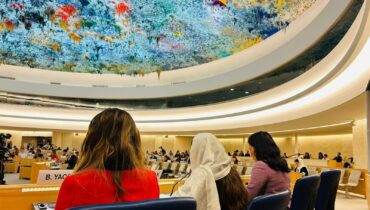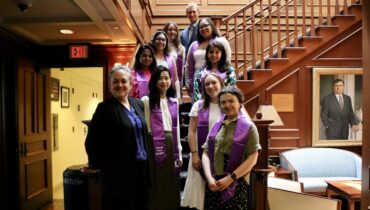The leader of Belarus’ democratic movement, Sviatlana Tsikhanouskaya, received the 2022 International Trailblazer Award from Georgetown University’s Institute for Women, Peace and Security for courageously standing up for democracy again the Lukashenko regime in Belarus.. She accepted the award “on behalf of all brave women of Belarus.” This is an excerpt from her conversation with Ambassador Melanne Verveer.
What motivated you to run for president of Belarus against all odds?
Sviatlana: My husband was also an ordinary person, and we had never been interested in politics in Belarus. But when he decided to open a small business in our country, he faced a lot of problems. He became a YouTube blogger and started to go from city to city, asking people: how do they live, what do they think about the political and economic situation, what do they think about corruption, and so on. And of course, immediately it threatened Lukashenka. The people asked my husband to campaign for the presidency and when he declared his campaign, he was immediately put in prison.
At that moment, I felt that it was important for me to show my husband that everything that he was doing was significant, that I support him. And I went to the Central Election Commission and gave my documents instead of my husband. My first step was only for my husband, for my love for him. I didn’t think about any revolutions, any changes. And actually, Lukashenko said that our Constitution is not for women. I’m sure that he allowed me to participate in this election campaign just to make fun of me. You know — “look, a housewife without any political background” — just to humiliate me. But he under-estimated Belarusians. He lost connection with Belarus and our people. He didn’t understand that for many years, there was discontent. The civil society in the nation was growing and people supported me. We saw such a huge wave of solidarity. People didn’t vote for me, as a person, because I understand that I was inexperienced. People voted for changes. I promised people that I will stay with them until new, free and fair elections and then they can choose anybody they want.
We were three women. Those women actually also stood with me instead of their men, one of whom was also imprisoned and another one had to flee Belarus. I have to admit that this is not my award: this is an award for all the Belarusian women who have been fighting since 2020, and for Masha Kolesnikova, who was my comrade, and is now sentenced to 11 years in jail.
After you won – by all accounts – the presidential election in 2020 you were forced into exile and the democratic, peaceful protests were brutally suppressed. What is the situation like now?
Sviatlana: The situation in Belarus at the moment is like in Stalin times, like in Gulag – people live with constant fear. All the alternative media have been ruined in Belarus. All possible NGOs have been closed. Thousands of people are in prisons, and they use violence, humiliation, and torture against them.
But Lukashenko miscalculated because he couldn’t imagine that our resistance, our uprising, would continue. Those who fled Belarus, they continue to fight from exile.
When the war [in Ukraine] started, for the first time since 2020 people in Belarus went to rallies in the streets to show their anti-war position. They knew that they would be detained. But it was important for us Belarusians to show that we are not a regime. We don’t support this war. And people started to perform acts of sabotage on the railways, to stop Russian equipment going through Belarus and reaching Russian troops on the border with Ukraine. Thousands of ordinary people took pictures of Russian troops and equipment, and sent this information to the Ukrainian army for them to be prepared for possible attacks. And keep in mind that for any anti-war comment, you could be detained and sentenced to years and years in jail.
Now the situation is rather difficult, but we understand the connection between the fate of Ukraine and the fate of Belarus. We really admire the bravery of Ukrainians in this war. We admire the unity of European countries who are supporting Ukraine in this fight. But also we admire brave Belarusians. And we understand that the fate of Ukraine and the fate of Belarus are intertwined. Without a free Ukraine, there will be no opportunity for the Belarusian people to get rid of the regime. So this is why it is our moral obligation to support Ukrainians in their difficult path. But we also realize that without a free Belarus, there will be a constant threat to Ukrainians, and to Poland, Lithuania and all the neighboring countries. So Belarus is part of this crisis, and this crisis has to be solved completely. So I ask you not to forget about Belarus, not to forget about the number of political prisoners.
What can people do to support the democratic movement in Belarus?
Sviatlana: I would like to say thank you to all the countries that, for the past two years, had a role in supporting the democratic movement in Belarus: creating economic and political pressure on the regime and not recognizing Lukashenko as a legitimate president of Belarus. And we are grateful to our closest neighbors, Lithuania and Poland, where hundreds of thousands of people found a safe haven for themselves. Of course, a lot still can be done:
- For politicians: stay consistent in your policy towards Lukashenko’s regime. On the one side, it’s important to create political and economic pressure on the regime, increase sanctions, and don’t trade with political prisoners. It’s a very important moment as Lukashenko feels fragile because Russian troops are being defeated in Ukraine and the Kremlin feels rather weaker than before. Create multiple points of pressure on the regime, but at the same time, also help the people of Belarus to keep our energy. You can’t even imagine how difficult it is to fight when you are repressed, when you are in exile.
- Support human rights defenders and political prisoners. At the moment we have about 1500 political prisoners and every prisoner needs a lawyer to visit him at least once a month. One visit costs €200, so just count how much assistance is
- We need financial support. We need support for our military volunteers, Belarusian military volunteers who are fighting shoulder to shoulder with Ukrainian people. You also can donate to families of political prisoners, because if men are in jail, it’s very difficult for their families to live normal lives, to survive. And there are cases when in prisons – women, mothers of minor children. Of course, it is very difficult for their relatives, their children to cope with a disaster without support. You can help them through the “A Country to Live in” foundation or the BYSOL campaign.
- We need assistance for our alternative media. You could find more information about how to support independent media.
- We need to promote our culture. We have to promote our personal identity. For many years, Lukashenka deliberately closed Belarusian schools and stopped printing Belarusian books. You know, he’s the most pro-Soviet person and the person who doesn’t love Belarus in our country. So we need to strengthen our national identity, to promote Belarus in different countries. If you can organize cultural events at a conference, increase awareness or attention to Belarus, please. It would be like a huge support to us.
- Write a letter to a political prisoner. It’s a very small, symbolic step. Just 10 minutes, 10 minutes of your life. But it will mean so much for a person who is suffering in jail, who is humiliated physically and morally. And when he or she gets a letter from abroad, from a wonderful person, there is understanding that, look, I’m not abandoned, I’m not alone. They are thinking about me. It is such a source of strength. You can write to political prisoners using this form, for example.
- We have a lot of organizations. Yes, they are in exile, but they know how to deliver assistance to Belarus. We have to be creative, actually, in non-conventional times and non-conventional decisions. On this page you can choose for yourself who you would like to help.
You can learn more about Sviatlana on her website or by following her on social media.


